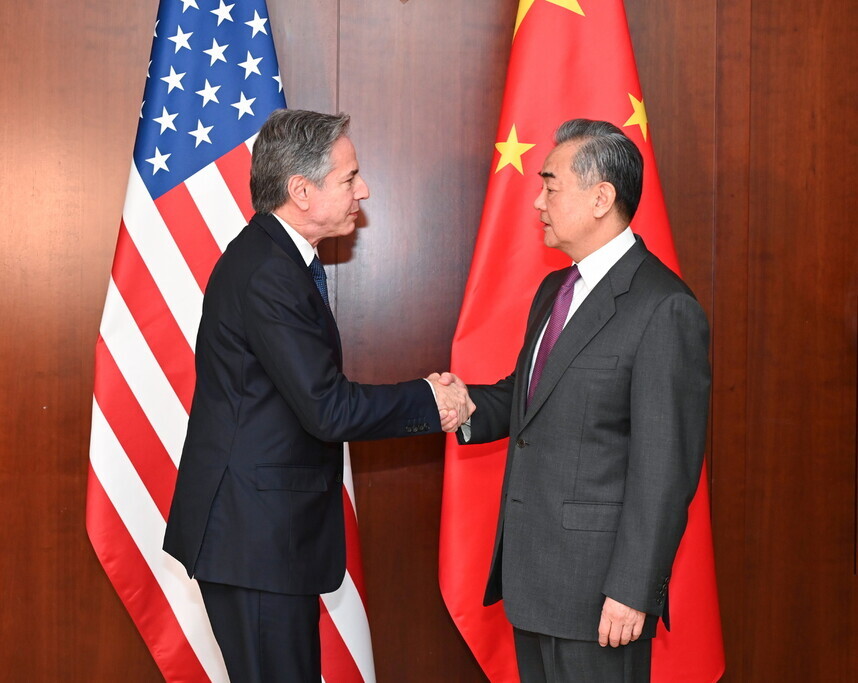hankyoreh
Links to other country sites 다른 나라 사이트 링크
China’s Wang Yi calls for ‘political resolution’ to Korean Peninsula issue

China’s foreign minister has called for a “political resolution” to the Korean Peninsula issue.
Addressing inter-Korean tensions during his keynote address at the Munich Security Conference on Feb. 17, Wang Yi declared, “China has made tireless efforts for the political resolution of the Korean Peninsula issue.”
“Now the most pressing task is to prevent a vicious cycle, address relevant parties’ reasonable security concerns, and deescalate and stabilize the situation,” he said.
Wang did not specifically name the “relevant parties,” but the context of his speech indicated he was referring to North Korea.
Launched at the height of the Cold War in 1963, the Munich Security Conference is the world’s largest international security conference. Senior government officials and industry experts attend from key nations around the world. This year’s conference saw US Vice President Kamala Harris and Ukrainian President Volodymyr Zelenskyy in attendance.
Wang laid out what he claims to be China’s general direction on foreign policy. He started off by declaring China’s positions on affairs concerning the US, Russia and the EU. Calling these regions the “major countries,” Wang said that “China will be a force for stability in promoting cooperation between major countries. Major countries shoulder critical responsibilities for global strategic stability.”
Wang then moved on to what he called the “hotspot issues” which he identified as Ukraine, the Korean Peninsula, and Israel’s war in Gaza.
Wang met with US Secretary of State Antony Blinken the day before the conference. The summit in Munich follows their meeting in Washington, DC, in October 2023 and a phone conversation in December 2023.
The US Department of State released a statement in which it said that Blinken “raised concerns over the PRC’s support for Russia’s war against Ukraine, including support to the Russian defense industrial base” during his meeting with Wang.
The State Department also stated that Blinken “emphasized the importance of maintaining peace and stability across the Taiwan Strait and in the South China Sea.”
The Chinese Foreign Ministry said in its release about the talks that Wang had criticized the US’ de-risking/decoupling from China, saying that they will “backfire to harm the US.” Wang also demanded that Washington lift “lift its illegal unilateral sanctions against Chinese companies and individuals” and warned against “obstructing China’s progress and refrain from doing things harmful to China's legitimate development rights and interests.”
By Choi Hyun-june, Beijing correspondent
Please direct questions or comments to [english@hani.co.kr]

Editorial・opinion
![[Guest essay] Preventing Korean Peninsula from becoming front line of new cold war [Guest essay] Preventing Korean Peninsula from becoming front line of new cold war](https://flexible.img.hani.co.kr/flexible/normal/500/300/imgdb/original/2024/0507/7217150679227807.jpg) [Guest essay] Preventing Korean Peninsula from becoming front line of new cold war
[Guest essay] Preventing Korean Peninsula from becoming front line of new cold war![[Column] The state is back — but is it in business? [Column] The state is back — but is it in business?](https://flexible.img.hani.co.kr/flexible/normal/500/300/imgdb/original/2024/0506/8217149564092725.jpg) [Column] The state is back — but is it in business?
[Column] The state is back — but is it in business?- [Column] Life on our Trisolaris
- [Editorial] Penalties for airing allegations against Korea’s first lady endanger free press
- [Editorial] Yoon must halt procurement of SM-3 interceptor missiles
- [Guest essay] Maybe Korea’s rapid population decline is an opportunity, not a crisis
- [Column] Can Yoon steer diplomacy with Russia, China back on track?
- [Column] Season 2 of special prosecutor probe may be coming to Korea soon
- [Column] Park Geun-hye déjà vu in Yoon Suk-yeol
- [Editorial] New weight of N. Korea’s nuclear threats makes dialogue all the more urgent
Most viewed articles
- 1Yoon’s broken-compass diplomacy is steering Korea into serving US, Japanese interests
- 2S. Korean first lady likely to face questioning by prosecutors over Dior handbag scandal
- 3[Reporter’s notebook] In Min’s world, she’s the artist — and NewJeans is her art
- 4[Guest essay] Preventing Korean Peninsula from becoming front line of new cold war
- 5After 2 years in office, Yoon’s promises of fairness, common sense ring hollow
- 6Lee Jung-jae of “Squid Game” named on A100 list of most influential Asian Pacific leaders
- 7AI is catching up with humans at a ‘shocking’ rate
- 8Hybe-Ador dispute shines light on pervasive issues behind K-pop’s tidy facade
- 9Japan says it’s not pressuring Naver to sell Line, but Korean insiders say otherwise
- 10[Column] The state is back — but is it in business?